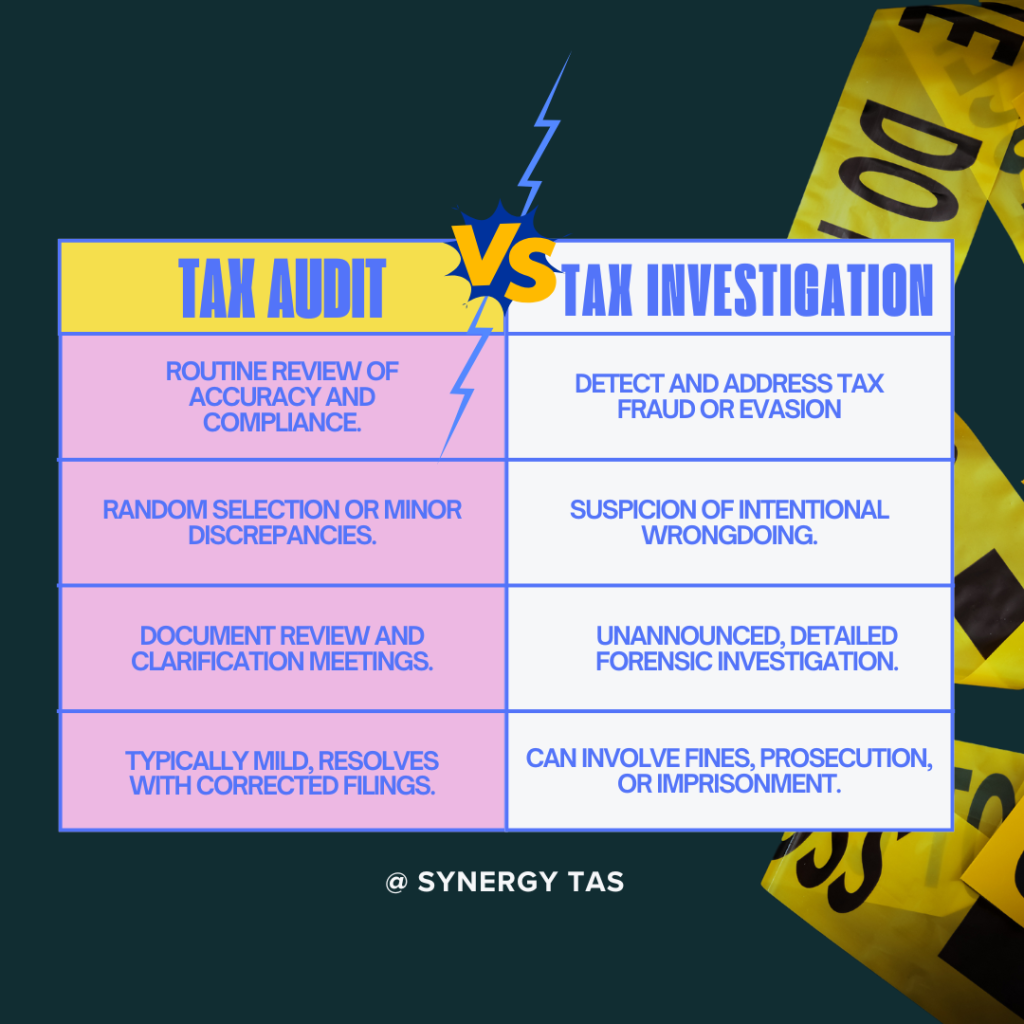Tax issues can feel overwhelming, especially when terms like tax audit and tax investigation come into play. While they may sound similar, these two processes differ significantly in their purpose, scope, and implications. Here’s a clear breakdown to help you understand.
What is a Tax Audit?
A tax audit is essentially a routine check-up conducted by tax authorities, such as Malaysia’s Inland Revenue Board (IRB). The purpose is to review your tax filings for accuracy and ensure compliance with tax regulations.
- Key Characteristics:
✔️ Focuses on specific years or filings.
✔️ Often triggered by discrepancies, unusual claims, or random selection.
✔️ Conducted in a cooperative environment, with taxpayers usually given a chance to explain or justify their filings. - Process Overview:
Authorities review supporting documents like receipts, invoices, and records. They may request meetings or site visits to clarify information. - Potential Outcomes:
- Reassessments if errors are found.
- Penalties for mistakes, but these are typically less severe if due to negligence and not intentional misconduct.
Tax audits are standard and often resolved quickly if your records are accurate and your filings align with the tax laws.
What is a Tax Investigation?
A tax investigation, on the other hand, is much more serious. It is carried out when tax authorities suspect fraud, evasion, or deliberate non-compliance. Unlike audits, these are not routine and are specific to potential violations.
- Key Characteristics:
✔️ Targets deliberate attempts to avoid taxes or conceal income.
✔️ Often initiated without prior warning.
✔️ Investigative officers may seize documents, freeze bank accounts, or involve legal action if necessary. - Process Overview:
The investigation is more intrusive. Officers may visit your home or business unannounced to collect evidence. They’ll investigate income, deductions, and transactions to uncover inconsistencies. - Potential Outcomes:
- Significant penalties, including hefty fines.
- Possible jail time for serious offenses.
- Ongoing scrutiny of future tax filings.
Tax investigations are far-reaching, and the consequences are much more substantial compared to audits.
How Do They Differ in Purpose and Scope?

| Aspect | Tax Audit | Tax Investigation |
|---|---|---|
| Purpose | Routine review of accuracy and compliance. | Detect and address tax fraud or evasion. |
| Trigger | Random selection or minor discrepancies. | Suspicion of intentional wrongdoing. |
| Process | Document review and clarification meetings. | Unannounced, detailed forensic investigation. |
| Severity | Typically mild, resolves with corrected filings. | Can involve fines, prosecution, or imprisonment. |
What Should Taxpayers Do?
- For Audits: Stay organized. Maintain proper documentation like expense receipts, salary slips, and declarations. Answer IRB’s queries promptly to close the audit smoothly.
- For Investigations: Cooperate fully and seek advice from experienced tax professionals. An expert can help mediate and offer sound defense if needed.
The Bottom Line
Understanding the difference between a tax audit and a tax investigation can help ease some of the stress these processes bring. While audits are a standard part of the tax system, investigations are much rarer and more severe. Either way, accuracy, transparency, and professional guidance are critical to staying compliant with Malaysia’s tax regulations.









